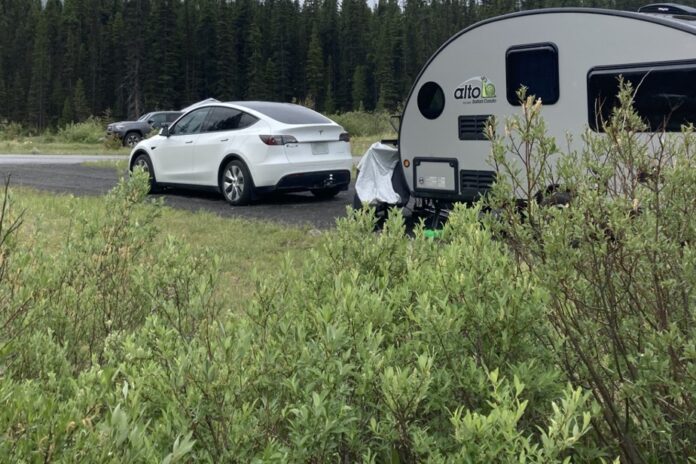For many caravanners, the freedom and pleasure of waking up in the middle of a green forest and inhaling its aromas have unparalleled therapeutic virtues. As pleasant as it is, this activity, which has greatly increased in popularity in Quebec since 2021, in many cases involves significant fuel consumption. As the automotive industry gradually adopts it, can electric power currently be a viable alternative for camping? Testimonies and insights into a phenomenon that is still not widespread.
For Claude Harvey, using an electric vehicle for camping was a matter of course. “For us, what comes out of the exhaust [of a gasoline vehicle] is waste. I don’t want to add to the atmosphere,” explains the retiree from Sherbrooke, who has been traveling to Canadian campgrounds with his partner for three years. During this period, Mr. Harvey logged no less than 25,000 km behind the wheel of his Tesla Model Y Long Range while towing a small trailer. He currently has a 17-foot-long Alto built by the Quebec company Safari Condo.
An electric motorist for nine years, he makes no secret of the fact that charging stations pose a significant challenge when towing a load with an electric vehicle, for various reasons. First, there is the inevitable planning related to autonomy, falling by around 50% in his case to be “between 175 and 225 km”.
The distance between the terminals also requires careful calculation of routes, a more acute problem in Western Canada, observed the caravanner, who specifies having chosen a Tesla model for the extent of the manufacturer’s network of superchargers which opens by elsewhere gradually to other brands.
The layout of the terminals itself can also prove problematic in certain cases, says Mr. Harvey. Despite the rather compact appearance of his trailer, it sometimes happened that he had to detach it in order to start recharging his vehicle.
In addition to not consuming fuel, which reduces costs and polluting emissions, towing a trailer with an electric vehicle has other significant advantages, according to Claude Harvey.
“Crossing Canada in an electric car while towing a trailer is very pleasant,” he says. “The vehicle is powerful, so no matter the hill, you activate the cruise control at 90 [km/h] and the vehicle maintains its speed. » Mr. Harvey also had no mechanical problems during his trips with his Model Y, which attests to the good thermoregulation of the SUV’s battery.
An electric vehicle also allows more complete independence at the campsite, because it can provide energy to the trailer when the site is not provided with electricity. The caravanner also emphasizes that he generally had no problems recharging his vehicle on the sites he visited.
“The reaction I observe is a lot of distrust,” Paul Laquerre, editor-in-chief of Camping Caravaning magazine, bluntly declares to La Presse. “All the prejudices people may have about electricity exist even more in caravanning,” he maintains. “People don’t know what the loss of autonomy is, which is holding them back. » An observation shared by Mr. Harvey: “Generally speaking, there is a lot of curiosity, but people are not ready to compromise. »
He explains this reluctance by the fact that sites sometimes have an outdated electricity network that they must exploit to the maximum. It is therefore important to find out before making a reservation.
“An electric car cannot be towed on its wheels,” also warns Mr. Laquerre, which forces its owner to place it on a complete trailer, an additional piece of equipment that is not accepted on all campsites . This is another element that can slow down its adoption among motorhome owners who tow a car while traveling.
As for recreational vehicle manufacturers, Mr. Laquerre believes “that there are many projects in the pipeline, but nothing concrete.” He notes the existence of the prototype of a trailer self-propelled by an electric motor unveiled last year by the Airstream brand. An innovative technology intended to increase the autonomy of the electric vehicle by reducing the load it tows by synchronizing the speed of the towing and towed vehicles.
Despite the pitfalls associated with caravanning with an electric vehicle, Mr. Laquerre judges that “there is a desire to move towards that” and that “it is coming”. “When I don’t pull my trailer, I don’t consume gasoline,” says Mr. Harvey. An even more relevant argument, it goes without saying.















